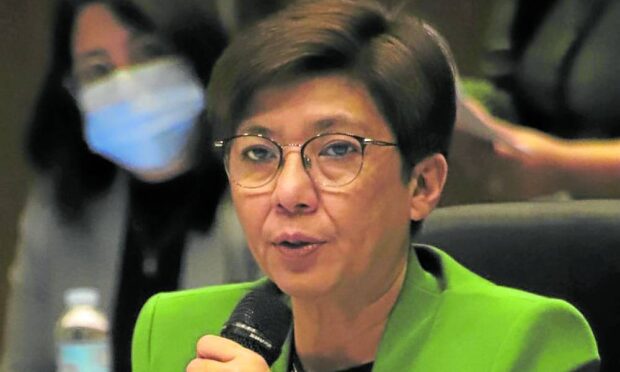
FILE PHOTO: Department of Health officer-in-charge Undersecretary Maria Rosario Vergeire. Photo from DOH
MANILA, Philippines — The Department of Health (DOH) on Wednesday said that lifting the country’s COVID-19 emergency status may only be possible once the healthcare system is sufficiently strengthened.
DOH officer in charge Undersecretary Maria Rosario Vergeire said there are certain conditions that must be met before the government can declare that the coronavirus crisis in the country has ended. These conditions include adequate surveillance protocols, healthcare preparedness, and COVID-19 policies, among others.
“Dito po sa Pilipinas kasi, our situation right now would be that we are trying to monitor our cases and we are trying to better prepare our health care systems. Nakikita naman natin na soon we will be able to lift this state of public emergency pero kailangan lahat nakaayos na before we can do that,” she said in a press conference.
(Here in the Philippines, our situation right now would be that we are trying to monitor our cases, and we are trying to better prepare our health care systems. We can see that soon we will be able to lift this state of public emergency, but it is necessary that everything is arranged before we can do that.)
Vergeire’s statement came as the United States has officially ended its COVID-19 national health emergency after more than three years.
READ: Biden ends US COVID-19 emergency status
The DOH official cited as an example the lapse in the government’s COVID-19 state of calamity declaration in which certain clauses were rendered nullified – specifically, provisions regarding Republic Act 11525, or the COVID-19 Vaccination Program Act of 2021 that served as legal basis for pandemic-related agreements such as the procurement of COVID-19 vaccines.
To recall, since President Ferdinand Marcos Jr. did not extend the state of calamity declaration, which was only until December 31, 2022, the procurement of COVID-19 bivalent vaccine has been facing delays.
READ: Bivalent vax purchase hit ‘roadblock’ as COVID-19 state of calamity in PH not extended
“We are now in constant coordination with the inter-agency task force, ‘yun pong mga iba’t ibang ahensiya plus syempre ‘yun pong mga legal provisions ng state of public health emergency na meron din po tayong fallback kung ano ang gagawin natin once na-lift ‘yan (public health emergency),” Vergeire said.
(We are now in constant coordination with the inter agency task force, and different agencies plus of course the legal provisions of the state of public health emergency so that we will also have a fallback on what we will do once the public health emergency has been lifted.)
Additionally, she stressed, the country’s response and surveillance capabilities must be bolstered, among others.
“So ‘yan ang kailangan natin gawin, in parallel, [as] we prepare for our healthcare system to have that kind of capacity. Kailangan itong policy environment natin maayos din natin para ‘pagka ni-lift na siya, meron tayong mga alternative so that we can continue doing whatever we were doing under the public health emergency,” Vergeire said.
(So that’s what we need to do, in parallel, as we prepare for our healthcare system to have that kind of capacity. There is a need for our policy environment to be fixed so that when it’s lifted, we have some alternatives so that we can continue doing whatever we were doing under the public health emergency.)
According to Vergeire, one of the measures that the DOH initiated to address these conditions is the bill creating the Philippine Center for Disease Prevention and Control (CDC).
“Nilagay namin sa CDC bill ‘yung mga ibang provision na nawala because of the [non-extension of the] state of calamity and eventually pinag-aralan kung itong mga nakatali sa public health emergency ay pwedeng ilagay din,” explained Vergeire.
(We put in the CDC bill the other provisions that were lost because of the [non-extension of the] state of calamity and eventually studied whether those tied to the public health emergency can be included, too.)
It is likewise better to lift the country’s COVID-19 emergency status when coronavirus cases are already manageable, she noted.
“So ‘pag dumating na sa punto na stable na talaga at nakikita natin na any kind of increase in cases ay kaya nang i-manage then we can already do that (lift public health emergency),” she said.
(So when it comes to a point where it is really stable and we see that any kind of increase in cases can be managed then we can already do that.)
RELATED STORIES
PH ready for lifting of state of public health emergency
Group: Lift state of public health emergency only if COVID cases drop in Q1 of 2023